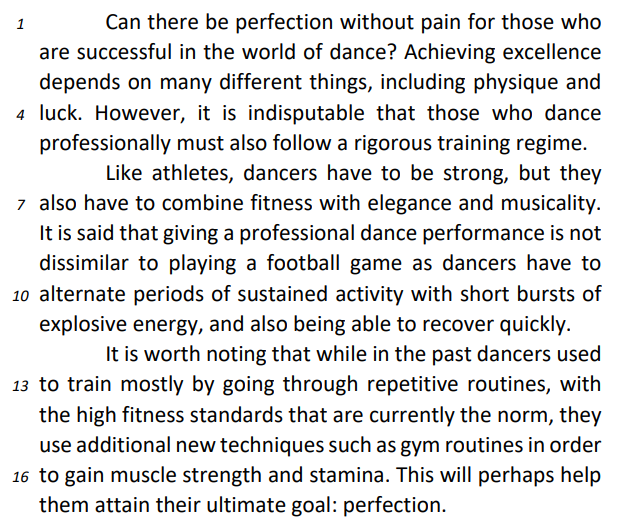Questões de Inglês - Sinônimos | Synonyms para Concurso
Foram encontradas 1.235 questões
Text for the question.
The route to perfection

TEXT 1
School for sexism
By Deborah Cameron (Oxford University)
This week, it was announced that schools in England are being issued with new guidelines on combatting sexism and gender stereotyping. This initiative follows research conducted for the Institute of Physics (IoP), which found that most schools took sexism less seriously than other kinds of prejudice and discrimination. […]
The IoP’s main concern—one it shares with the government, which co-funded the research—is that girls are being deterred from studying science subjects by the sexist attitudes they encounter in school. Language is only one of the issues the report urges schools to tackle. […] But language was the main theme picked up in media reporting on the new guidelines, with many news outlets dramatically proclaiming that children ‘as young as five’ were going to be ‘banned’ from using certain words.
[…] I think we can guess why these newspapers were so keen on the language angle. They’ve known since the heyday of ‘political correctness gone mad’ that nothing stirs up the wrath of Middle England like a story about someone trying to ban words. Never mind that no sane parent permits total free expression for the under-fives […].
This reporting only underlined the point that sexism isn’t taken as seriously as other forms of prejudice. […] Rather than being outraged by the idea of telling primary school children to watch their words, shouldn’t we be asking why ‘children as young as five’ are using sexist language in the first place?
We may not want to think that this is happening among children still at primary school, but unfortunately the evidence says it is. […] Girl Guiding UK publishes an annual survey of girls’ attitudes: the 2015 survey, conducted with a sample of nearly 1600 girls and young women aged between 7 and 21, found that in the week before they were questioned, over 80% of respondents had experienced or witnessed some form of sexism, much of which was perpetrated by boys of their own age, and some of which undoubtedly occurred in school. 39% of respondents had been subjected to demeaning comments on their appearance, and 58% had heard comments or jokes belittling women and girls. […]
By the time they go to secondary school, girls are conscious of this everyday sexism as a factor which restricts their freedom, affecting where they feel they can go, what they feel able to wear and how much they are willing to talk in front of boys. In the Girl Guiding UK survey, a quarter of respondents aged 11-16 reported that they avoided speaking in lessons because of their fear of attracting sexist comments.
So, the Institute of Physics isn’t just being perverse when it identifies sexist ‘banter’ as a problem that affects girls’ education. It’s to the organization’s credit that it’s saying this shouldn’t be tolerated—and it’s also to its credit that it’s offering practical advice. Its recommendations are sensible, and its report contains many good ideas for teachers to consider. […]
When the Sunday Times talks about ‘boys and girls cheerfully baiting each other in the playground’, the implication is that we’re dealing with something reciprocal, a ‘battle of the sexes’ in which the two sides are evenly matched. But they’re not evenly matched. What can a girl say to a boy that will make him feel like a commodity, a piece of meat? What popular catchphrase can she fling at him that has the same dismissive force as ‘make me a sandwich’? […]
The IoP report does not seem to grasp that there is more to sexism than gender stereotyping. It falls back on the liberal argument that stereotyping harms both sexes equally: it’s as bad for the boy who wants to be a ballet dancer as it is for the girl who dreams of becoming an astrophysicist. But sexism doesn’t harm boys and girls equally, just as racism doesn’t harm white people and people of colour equally. It is the ideology of a system based on structural sexual inequality: male dominance and female subordination. You can’t address the problem of gender stereotyping effectively if you don’t acknowledge the larger power structure it is part of.
Disponível em: https://debuk.wordpress.com. Acesso em: 20 out. 2019.
Choose the group of synonyms which could respectively replace them.
Associate the first column according to the correct meaning of the second one.
I -To invite someone for a date.
II - Make a copy of computer data.
III - Persuade someone to drop the price of something they’re selling.
IV - Narrowly win in competition.
V - Arrive, sometimes suddenly or unexpectedly.
( ) He wanted to ASK her OUT but was too shy.
( ) I BARGAINED her DOWN to half what she originally wanted.
( ) He BLEW IN from Toronto early this morning.
( ) You should always BACK UP important files and documents so that you won’t lose all your work if something goes wrong with the hardware.
( ) The marathon runner barely BEAT OUT his rival at the tape.
According to the fourth paragraph, Kate quit studying chemistry.
The verb QUIT in this context means:

